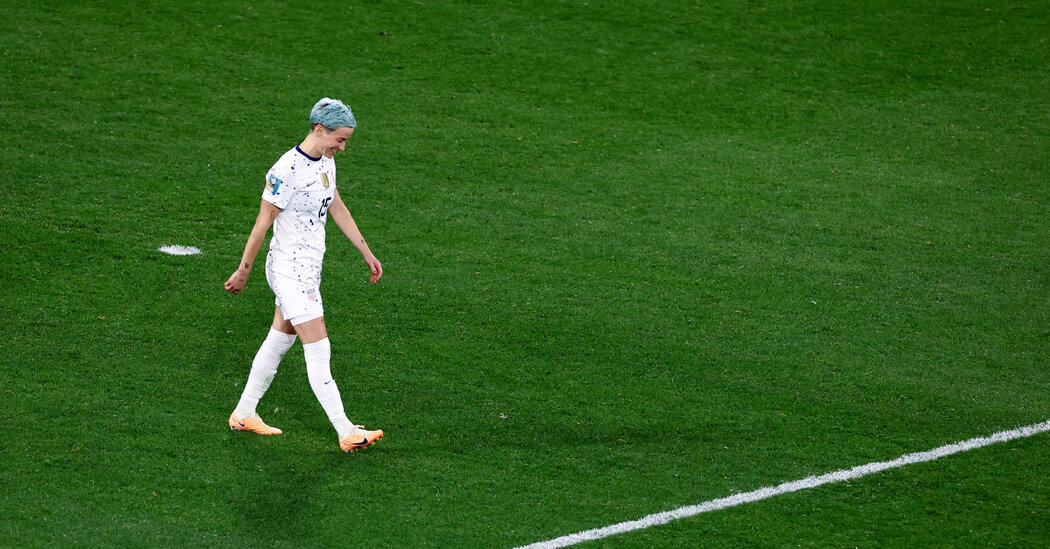It ended the most excruciating way for Megan Rapinoe, a penalty kick skied over the crossbar, shock, disappointment, a rueful smile to herself.
“It’s just like a sick joke to miss a penalty,” Rapinoe said after the United States had been eliminated, 5-4, on penalty kicks after a scoreless tie with Sweden on Sunday in the round of 16 of the Women’s World Cup.
Rapinoe could not remember the last time she missed a penalty kick. She was sent on as a substitute late in Sunday’s game because she was so reliable. It was her penalty kick that provided the decisive goal in the final of the 2019 World Cup. This time, accuracy betrayed her on a night when age and injury showed in her legs.
There is more soccer to play. A National Women’s Soccer League championship to chase in Seattle with the OL Reign. But her announced retirement will arrive this fall at age 38. The light of Rapinoe’s renowned and polarizing career as a player and activist has now gone into shadow on the World Cup stage, where she played her best and emphatically spoke her mind.
She was a defining athlete of her generation, one of the first publicly gay players on the women’s national team; a ruthless and creative forward who delivered in the most tense and revealing moments; a self-described “walking protest” who jousted with a president, knelt for the national anthem and fought for equal pay and equitable treatment on L.G.B.T.Q. issues with what Julie Foudy, a former national team captain, has described as a willingness to “boldly disrupt.”
After Sunday’s game, Rapinoe joked with reporters but tears also came into her eyes.
“Well, now that I’m 38 and in therapy, I was like, ‘This is life,’” she said. Of course, she wished the United States was still competing for a third consecutive World Cup title. Of course, she wished there was at least one more game to play. But, Rapinoe added, “I feel like it doesn’t take away anything from this experience or my career in general.”
During the 2019 Women’s World Cup, Franklin Foer, writing in The Atlantic, called Rapinoe “her generation’s Muhammad Ali,” who like the heavyweight boxing champion also became a “hero of resistance” with “sly humor and irresistible swagger.”
Sometimes Rapinoe worked blue, both in her choice of hair color and in her choice of words. She was unfailingly and unguardedly open, never more so than during that 2019 World Cup in France.
Before the tournament, Rapinoe and her teammates sued the United States Soccer Federation for gender discrimination. Then, in the days approaching an intense quarterfinal match against France in Paris, Rapinoe feuded publicly with former President Donald J. Trump, who admonished her to win before talking.
Instead of wilting amid the scrutiny, she scored both goals in a 2-1 American victory and ran toward the corner flag, spreading her arms in celebration and defiance.
Afterward, Rapinoe was quoted as saying with joyful seriousness about her performance, which came during Pride Month, “Go gays!” And: “You can’t win a championship without gays on your team — it’s never been done before, ever. That’s science, right there.”
Rachel Allison, an associate professor of sociology at Mississippi State University who studies women’s soccer, said, “What I think is really extraordinary about her, and will ultimately place her among the greats, is how she led through activism, which generated enormous levels of public scrutiny, while at the same time remaining in top athletic form and unapologetically herself through it all.”
Winning, Rapinoe acknowledged often, was a necessary platform on which to build her activism. She retires with two World Cup titles and one Olympic gold medal. In 2019, she was honored as the World Cup’s best player and leading scorer.
“Without the winning you don’t get the media, you don’t get the eyes, you don’t get the fans, you don’t get the ability to say what you want all the time because people want to talk to you no matter what,” Rapinoe said earlier in this tournament.
In the 2011 Women’s World Cup, Rapinoe helped to deliver one of the most urgent and famous victories for the women’s national team. In the dying moments of a quarterfinal match against Brazil, she delivered a feathery cross to Abby Wambach, whose header helped turn an apparent defeat into eventual victory in penalty kicks.
It was the latest goal ever scored during a Women’s World Cup match, a moment in which, Rapinoe said, “I announced myself.”
The United States lost the 2011 final to Japan, but a new generation of players, Rapinoe among them, had “reignited the team’s popularity,” halting its slide toward “cultural irrelevance” after the retirement of stars like Mia Hamm from the 1999 World Cup champion team, said Caitlin Murray, a soccer journalist and the author of “The National Team: The Inside Story of the Women Who Changed Soccer.”
“From 2005 to 2011, the team had faded into obscurity,” Murray said in an email. The victory over Brazil “was a jolt that made people want to pay attention again.”
Rapinoe’s arrival also broadened and evolved the advocacy embraced by the United States women’s teams before her. The groundbreaking 1999 team advocated for equitable treatment on issues mostly related to soccer itself. Rapinoe advocated for some of the same issues, but also protested against police brutality and vigorously campaigned for the rights of gay and transgender people.
“Her legacy is being a voice for some people who feel like they don’t have one,” said Briana Scurry, the star goalkeeper on the 1999 team. “She’s willing to stick her neck out there and take the criticism that other people may not be willing to do.”
In 2016, Rapinoe took a knee during the playing of the national anthem before a match in solidarity with of Colin Kaepernick’s protest against police brutality and social injustice. W.N.B.A. players were also kneeling during that period, but it was Rapinoe’s protest that made national headlines.
While Rapinoe has acknowledged her white privilege, said Allison, the sociology professor, she received outsized attention for her racial activism without experiencing the harsh consequences that Black athletes historically receive for protests. Ali, for instance, was stripped of his heavyweight title for refusing to fight in the Vietnam War and banned from boxing for three years.
“For a lot of Black athletes, it has cost them very dearly, sometimes their entire careers,” Allison said, while Rapinoe “has largely lost nothing and even gained from her activism.”
It was clear during Sunday’s playing of the U.S. anthem that not all of Rapinoe’s teammates agreed with her continued refusal to sing or place her hand over her heart. On a podcast last year, the former American stars Carli Lloyd and Hope Solo expressed discomfort with what they described as the “culture” of the national team extending its advocacy beyond a desire to win soccer matches to playing “political and social games.”
Many others were more embracing of Rapinoe’s athletic and activist achievements. Four months after Lloyd and Solo criticized her, Rapinoe was awarded the Presidential Medal of Freedom, the nation’s highest civilian honor. And the United States women’s team signed a collective bargaining agreement to receive equal pay with the men’s national team after decades of negotiations and years of court fights.
Without Rapinoe’s exceptional performance in leading the United States to the 2019 World Cup title, said Murray, “the U.S. probably doesn’t win that tournament, and the team probably doesn’t have the momentum in their equal pay fight to prompt U.S. Soccer to make a deal.”
That is why it feels the right time to end her career, Rapinoe said Sunday. And, she added, maybe there was even dark humor in missing a penalty kick. “I joke too often, always in the wrong places and inappropriately,” she said, “so maybe this is ha-ha at the end.”
Sumber: www.nytimes.com








